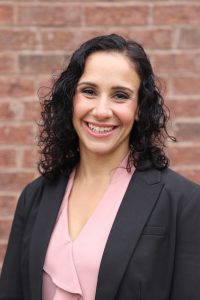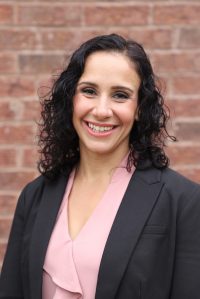Secular Synagogues and Online Judaism
This week’s post is by Rabbi Denise Handlarski, the creator and spiritual leader of the online community SecularSynagogue.com in Toronto.
SecularSynagogue.com is an online community for secular/cultural Jews. We connect in the digital 
Rabbi Sid Schwarz outlines the distinction between what he calls “tribal Jews and covenantal Jews”: “In contrast to tribal Jews, covenantal Jews see their identity less as a matter of group solidarity than as a spiritual legacy. I use the term “covenantal” to distinguish behaviors that align with core teachings of Judaism even if those behaviors are not attached to overt forms of affiliation with the group. If covenantal Jews feel an affinity to Judaism, it is because of the ethics and values that Judaism has brought into the world, such as justice (tzedek), compassion (chesed), human dignity (tzelem elohim), and the protection of those who are most vulnerable (ahavat ger)”. What Rabbi Sid alludes to but does not say is that many of these Jews are atheist/agnostic and so are completely unserved by even the most dynamic and creative communities where prayer, God/dess worship, and traditional liturgy are still central.
I serve Jews who we might call “covenantal” but who likely feel “post-covenantal.” There is nothing in Jewish tradition, including text, ritual, or practice, that is compelling simply because it is too God-centric. There are a great many Jews who would sooner abandon Judaism altogether than have to submit to a style of Judaism that is boring, out of touch, or unethical. Yet, as Rabbi Sid notes, we are living in incredibly complex and emotionally-demanding times, with genuine fear for the future of the world, the politics of division, and the rise in the expression of hate. Schwarz says, and I agree, “I believe that the crisis in American society at the dawn of the twenty-first century cries out for a spiritual response”. That response, however, needs to be inclusive of people who identify as: atheist, agnostic, spiritual but not religious, skeptical but seeking, culturally Jewish. It needs to offer a secular spirituality so people can connect without having to compromise on what they believe, say words/prayers they don’t believe, and, especially, be told that if they don’t believe in God then they aren’t “real” Jews.
All four of Rabbi Sid’s propositions are crucial: Our online community fosters wisdom, social justice, community, and lives of sacred purpose. I believe we are doing all of these, and doing them well in the online space.
Wisdom: We do online text and Talmud study. We have a book club where we read Jewish fiction as well as study and discuss race and gender issues in Jewish life. We have worked on Mussar and Jewish ethics. We went through the White Supremacy and Me workbook together, teaching each other how to fight for racial justice within our own community and in the many communities we inhabit. We share contemporary wisdom from contemporary thinkers via sharing articles and insight pieces. We engage in communal and individual reflection. We can all do this from wherever we are, whenever we have time, because the resources are posted and then available at our leisure.
Social Justice: This is the cornerstone of our community. We do #MitzvahMonday challenges together and sometimes lead larger social justice projects. This has included Indigenous People’s rights activism, climate change advocacy and protests, leading hikes for Rosh Hashanah that involve tashlich (the ritual of casting away sins) and raising money for groups that are food insecure. We also do local and small-scale mitzvah work like surprising co-workers with treats, shoveling the snow off a neighbor’s walk, and paying for the coffee of the next person in line.
Community: Our whole purpose is “connected community,” that is, community in the online space. I agree with this proposition but not its premise: “ At a time when technology has made meaningful social intercourse much harder to come by, the Jewish community must offer places where people can find support in times of need, communal celebration in times of joy, and friendships to make life fulfilling”. One of the pitfalls of Jewish congregations is to privilege real time and space engagement over online engagement. However, there are many people who find it very hard to forge meaningful connections in person and they do much better online. This could be because they are introverts, shy about their level of Jewish knowledge, or because the style of services and celebrations often means that there is not an opportunity for meaningful social engagement. Good congregations work on this, and I have tried to work on it in my Toronto-based congregation. But, the fact of the matter is that, the online space offers opportunities for community that are unavailable in person.
In my congregation I might see members in person once a week. That is the best-case scenario. Usually it is less frequent than that. But I engage with my online community every day. I can do it from anywhere and without any commuting time. While I can’t give my online community members a hug, I can answer their questions or reply to their posts almost immediately. We see each other in real time once a month via teleconference, which truly feels just as and if not more intimate than in-person gatherings. There are meaningful ways we can do exactly what Schwarz says: “find support in times of need, communal celebration in times of joy, and friendships to make life fulfilling” in the online space.
Lives of Sacred Purpose: SecularSynagogue.com aspires to create meaningful, valuable, beautiful Jewish learning, experiences, and community for secular/cultural Jews. Our Judaism will foster two-directional goodness. It will make our lives richer/better and, in turn, it will make us better so that we can create more goodness in the world. Leading lives of sacred purpose is the entire point of the community, and of Judaism more broadly.
Rabbi Denise Handlarski is the creator and spiritual leader of the online community SecularSynagogue.com. She also serves the Oraynu Congregation for Humanistic Judaism in Toronto and serves families as “Jewish Doula”.



July 20, 2020 @ 10:23 am
Best yet!